#Vivekananda
Photo

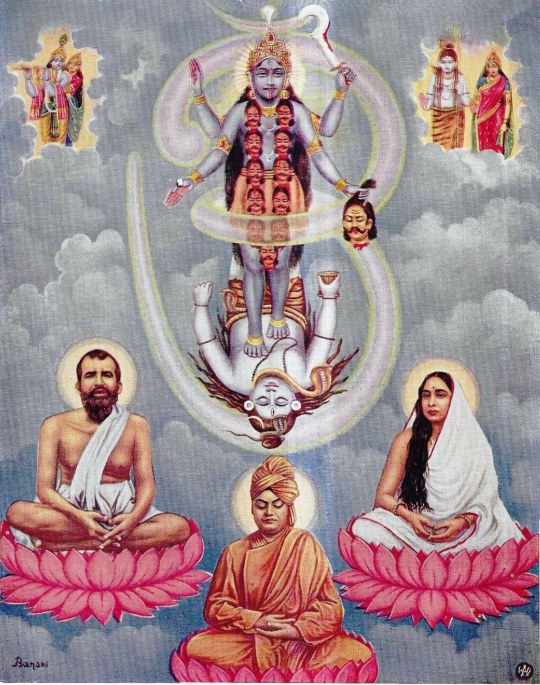
Shadhona
Kali Maa Lord Shiva in Om, Sri Ramkrishna Paramhansa, Maa Anandamayi Swami, Vivekanand Shadhona Size W 6.4" X 8.4"
(via CollectorBazar: Mumbaiphilatelist52)
115 notes
·
View notes
Text

Vivekananda Rock Monument, Kanyakumari, INDIA
15 notes
·
View notes
Photo

Le temps qui venge toutes choses, passe, et rien ne reste. Il engloutit le saint et le pêcheur, le roi et le paysan, la beauté et la laideur. Il ne laisse rien. Toutes choses se précipitent vers ce but unique, la destruction. Notre savoir, nos arts, nos sciences, tout s'y précipite. Personne ne peut endiguer la marée, personne ne peut l'arrêter, ne fût-ce qu'une minute. Nous pouvons essayer de l'oublier, de même que dans une ville où sévit la peste, les gens cherchent l'oubli dans la boisson, la danse, ou d'autres vaines tentatives, et dans l'hébétude qu'ils y trouvent. De même nous essayons d'oublier, nous essayons de créer l'oubli par toutes sortes de plaisir des sens. Et cela c'est Mâyâ. (...)
D'un côté il y a par conséquent cette déclaration audacieuse que tout ceci n'est que sottises, que tout est Mâyâ, mais par ailleurs il y a cette autre déclaration pleine d'espérance, qu'au-delà de Mâyâ existe une issue. Les gens pratiques nous disent par contre : « Ne vous cassez pas la tête avec toutes ces niaiseries de religion et de métaphysique. Vivez ici-même ; c'est un bien mauvais monde en réalité, mais tirez-en ce que vous pourrez ». Ce qui, mis en termes clairs, signifie : « Vivez, dans l'hypocrisie et le mensonge, une vie de fraude continuelle, dans laquelle vous dissimulerez vos plaies aussi bien que vous le pourrez. Continuez à raccommoder et à rapiécer, jusqu'à ce que tout soit perdu et que vous ne soyez plus qu'un assemblage de pièces et de morceaux ». C'est ce qu'on appelle la vie pratique. Ceux qui se contentent de ce rapiéçage ne viendront jamais à la religion. La religion commence par un mécontentement intense de l'état actuel des choses et de notre vie, par une haine, une haine violente de ce rapetassage de la vie, avec un dégoût sans bornes pour ce qui est fraude et mensonge.
Celui-là seul peut être religieux qui ose parler comme le puissant Bouddha l'a fait une fois sous l'arbre de la sagesse, alors que cette notion du pratique se présentait à lui, qu'il voyait qu'elle n'était que sottise, et que pourtant il ne trouvait pas de solution. Lorsque la tentation lui vint de renoncer à sa recherche de la vérité de retourner dans le monde et de reprendre la vieille vie de tromperies, où l'on donne aux choses des noms qui ne sont pas les leurs, où l'on ment à soi-même et à tous les autres, lui, le géant, triompha de cette tentation et dit : « Mieux vaut la mort qu'une vie ignorante et végétative ; mieux vaut mourir sur le champ de bataille que vivre une vie de défaite ». C'est là la base de la religion. Lorsqu'un homme adopte cette attitude, il est sur la voie où il trouvera la vérité, il est sur la voie qui mène à Dieu. Cette détermination doit être la première impulsion qui nous pousse à devenir religieux. « Je vais me frayer un chemin. Je connaîtrai la vérité ou j'y laisserai ma vie. Car de ce côté-ci, il n'y a rien, tout s'en va et tout disparaît tous les jours ».
L'homme qui est aujourd'hui beau, jeune, plein d'espérance, demain sera vieux. Les espoirs, les joies, les plaisirs périront comme des fleurs sous la gelée de demain. C'est un des aspects ; de l'autre côté, il y a le charme puissant de la conquête, des victoires remportées sur tous les maux de la vie, des victoires sur la vie elle-même, de la conquête de l'univers. De ce côté-là, les hommes peuvent tenir bon. Par conséquent ceux qui osent lutter pour la victoire, pour la vérité, pour la religion, sont sur la bonne voie, et c'est ce que prêchent les Védas. « Ne soyez pas dans le désespoir ; le chemin est très difficile, comme si l'on devait marcher sur le tranchant d'un rasoir. Malgré cela, ne désespérez pas, levez-vous, éveillez-vous, et trouvez l'idéal, le but ».
— Swâmi Vivekânanda (Jnâna-Yoga, posth., 1936)
8 notes
·
View notes
Text
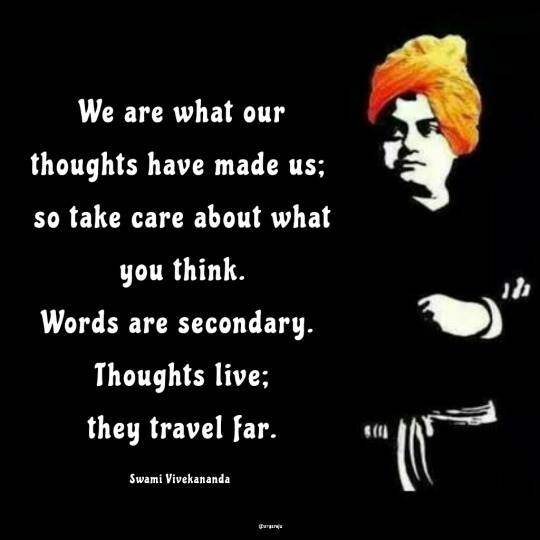
#quote#quotes#motivation#inspiration#thoughts#wisdom#photoquotes#QuoteoftheDay#Vivekananda#SwamiVivekananda
5 notes
·
View notes
Text
Swami Vivekananda Quotes that Inspires and Motivates Us

Swami Vivekananda Quotes: Swami Vivekananda was born 0n 12th Jan 1863 in Calcutta and his real name is Narenranath Datta, an Indian Hindu Monk. Founder of Ramakrishna Mission and Ramakrishna Math.
Swami Vivekananda Quotes
“Everything is easy when you are busy. But nothing is easy when you are lazy.” – Swami Vivekananda Quotes!
“All knowledge that the world has ever received comes from the mind; the infinite library of the universe is in our own mind.”
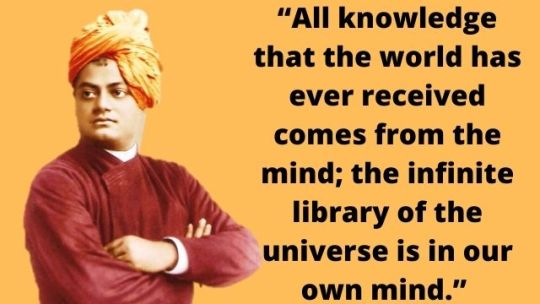
Talk to yourself at least once in a day otherwise you may miss meeting an excellent person in this world.”
“Things do not grow better; they remain as they are. It is we who grow better, by the changes we make in ourselves.”
“All knowledge that the world has ever received comes from the mind; the infinite library of the universe is in your own mind.”
“We are what our thoughts have made us; so take care about what you think. Words are secondary. Thoughts live; they travel far.”
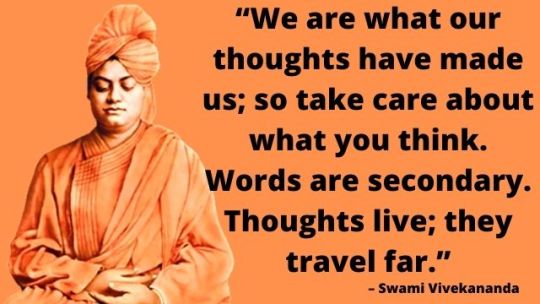
Vivekananda Quotes in English
“We are what our thoughts have made us; so take care about what you think. Words are secondary. Thoughts live; they travel far.”
“In a day, when you don’t come across any problems – you can be sure that you are traveling in a wrong path.”
“This life is a hard fact; work your way through it boldly, though it may be adamantine; no matter, the soul is stronger.”
Swami Vivekananda Quotes On Knowledge
“The goal of mankind is knowledge . . . What man “learns” is really what he discovered by taking the cover off his own soul, which is a mine of infinite knowledge.”
“Stand on your own feet, and assimilate what you can; learn from every nation, take what is of use to you”. Swami Vivekananda Quotes!
Education which does not help the common mass of people to equip themselves for the struggle for life, which does not bring out the strength of character, a spirit of philanthropy, and the courage of a lion — is it worth the name? Real education is one which enables one to stand on one’s own legs.
“If you have knowledge and see a man weak, do not condemn him. Go to his level and help him if you can. He must grow.”
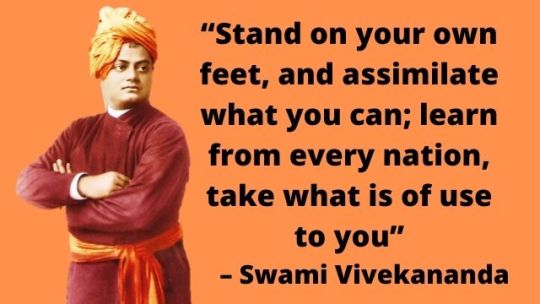
“You are the greatest book that ever was, or ever will be, the infinite depository of all that is. Until the inner teacher opens, all outside teaching is in vain.”
Do you feel for others? If you do, you are growing in oneness. If you do not feel for others, you may be the most intellectual giant ever born, but you will be nothing; you are but dry intellect, and you will remain so. Swami Vivekananda Quotes!
“Two gifts are especially appreciated, the gift of learning and the gift of life. But the gift of learning takes precedence. One may save a man’s life, and that is excellent; one may impart to another knowledge, and that is better.” Swami Vivekananda Quotes!
“Education is not the amount of information that is put into your brain and runs riot there, undigested, all your life.”
“We need technical education and all else which may develop industries, so that men, instead of seeking for service, may earn enough to provide for themselves, and save something against a rainy day.”
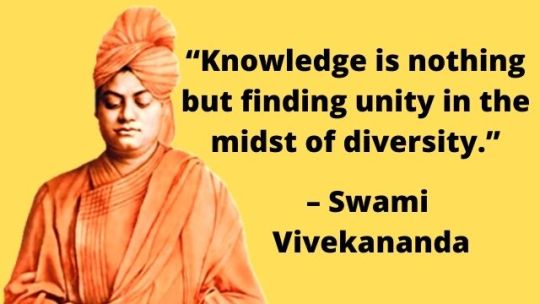
Quotes On Education By Swami Vivekananda
How can there be any progress of the country without the spread of education and the dawning of knowledge?
The only way to bring about the leveling of caste is to appropriate the culture, the education which is the strength of the higher castes.
There is only one purpose in the whole of life — education. Otherwise what is the use of men and women, land and wealth?
To me the very essence of education is concentration of mind, not the collection of facts. If I had to do my education over again, and had any voice in the matter, I would not study facts at all. I would develop the power of concentration and detachment, and then with a perfect instrument I could collect facts at will. Side by side, in the child, should be developed the power of concentration and detachment.
We have had a negative education all along since our boyhood. We have only learnt that we are nobodies. Seldom are we given to understand that great men were ever born in our country. Nothing positive has been taught to us. We do not even know how to use our hands and feet!
We want an education by which character is formed, strength of mind is increased, the intellect is expanded, and by which one can stand on one’s own feet.
Read More
#swami vivekananda quotes#swami vivekananda#swami vivekananda quotes in hindi#vivekananda quotes#swami vivekananda inspirational quotes#swami vivekananda quotes in english#swami vivekananda motivational quotes#swami vivekananda speech#swami vivekananda quotes on youth#vivekananda#quotes of swami vivekananda#swami vivekananda in hindi#swami vivekananda thoughts#swami vevekananda quotes#vivekanand quotes#quotes#swami vivekananda motivational quotes in english
3 notes
·
View notes
Photo
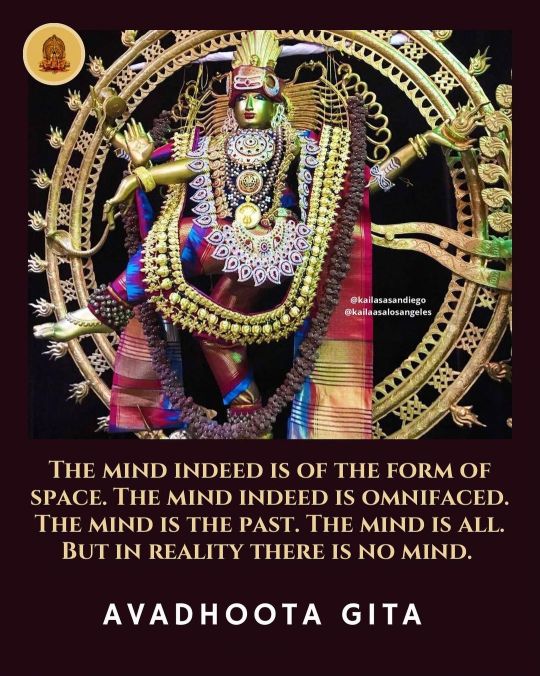
Be in the sublime state of #unclutching and #realize the nature of your #existence! Does mind exist? @srinithyananda @nithyanandeshwaratemple_la #nithyananda #advaitavedanta #advaita #dattatreya #brahma #vishnu #mahesh #incarnation #vivekananda #selfrealization #freeyourmind #arunachala #shivashakti #upanishads #kailasa #enlightenment #spirituality #hinduism #sanatanadharma #vedic #superconsciousness #consciousness https://www.instagram.com/p/ChJLUVVrhs1/?igshid=NGJjMDIxMWI=
#unclutching#realize#existence#nithyananda#advaitavedanta#advaita#dattatreya#brahma#vishnu#mahesh#incarnation#vivekananda#selfrealization#freeyourmind#arunachala#shivashakti#upanishads#kailasa#enlightenment#spirituality#hinduism#sanatanadharma#vedic#superconsciousness#consciousness
2 notes
·
View notes
Text

For #booking contact us @ 9626403300 / 7449109109 #sivasudartravels #ssTravelAroundTheWorld
#kanyakumari#package#Bhagvathi#Amman#Temple#Vivekananda#rock#memorial#Thiruvalluvar#statue#Kamarajar#Mandapam#museum#Tirupati#devasthanam#Padmanabhapuram#palace#Thirparappu#waterfalls#Mathoor#Hanging#Bridge#tour#travel#home#stay#resorts#hotels#trekking
4 notes
·
View notes
Text
Tvam Tat Asi (thou art that)
- The Shiva Sutras
3 notes
·
View notes
Text
Discernment (Viveka)
The practice of discernment (viveka) is the simple practice of looking in order to figure out what’s what. We do it all the time, which is how we are able to take decisions in life. When we are able to distinguish right from wrong, or good from bad, most of us choose to do what is right or what is good. Another criterion we use is to do what is in our best interest, or what makes us happy and helps us avoid pain and suffering. It is obvious that we need to look and think in order to determine what makes sense and what doesn’t, what is right and what isn’t, what is worth pursuing and what isn’t.
As the first of the Four Practices (sādhana-catuṣṭaya) though, discernment is not merely the practice of looking and deciding, but looking deeply and carefully and only then deciding. This makes a huge difference. Sometimes we don’t look long enough or deep enough and sometimes we are in too great a hurry. The decisions made without sufficient thought often misfire and we end up doing things that we later regret. We have all made such mistakes sometime or other, perhaps often.
It is true that we may not have the luxury of time always. Sometimes we are required to take split-second decisions. There is no time to think then. We just have to go with our gut. But such situations are rare. Most decisions in life don’t have to be made instantly. If we take our time, if we pause to take a deep breath and look carefully, we may notice things we may have missed before. Looking deeply and carefully is at the heart of discernment. Only when we look deeply do we see the nuances and the subtleties involved. That increases our chances of choosing well. When our choices are wise, we suffer less and rejoice more.
But there is more to discernment than simply avoiding pain and being happy. When looking deeply becomes a habit, we notice that things are not always how they appear to be. What feels like a good thing may, upon close observation, turn out to be not so good. What feels worthless at first sight may be found to be valuable when we take a closer look. This teaches us to not be taken in by appearances. When we begin to see things as they truly are, we are able to take good decisions.
Something more happens as well. Because we now notice things that we had missed before, we inevitably start asking the kind of questions we did not ask before. Discernment is like deep sea diving. Under water we encounter a new world, a world that was not visible on the surface. Looking deeply also reveals to us a new world. We see others with a new pair of eyes. The world feels different. Naturally, questions arise.
I may look at a chair and begin to wonder—is this object anything more than material particles held together somehow in a form which is assigned a name in every language? I may look at the world and ask—is the world simply an expansive ocean of atoms and molecules, or protons and electrons, held in place by various forces? What makes the people around me different from “objects”? Why are people and animals classified as “living” and the chair before me is “nonliving”? When I meet a friend, I am really seeing a physical body which is responsive and looks conscious. Is my friend simply a body? What about the friend’s mind and the intellect? Are those material too? Is there anything at all which is not material?
The practice of looking deeply may fuel in my heart the urge to know if life has any ultimate purpose beyond my efforts to make the most of life until I am devoured by death. I may want to know who this “me” is for whose sake I do whatever I do. Unless I figure out who this “me” is, how can I make sense of whatever is seen as “mine”? Does the “me” survive death? If it does, then who really dies? Also, where does this “me” disappear when I’m asleep? What is this mysterious movie called dream that I see every night? How does it manage to appear as real as the world I’m seeing at present? My world vanishes when I sleep and the dream world vanishes when I wake up. Neither of these persists without break, so why do I think of one as real and the other as unreal? Are these two worlds really different?
Most of these questions, and their possible answers, can be unsettling. They can shatter my present understanding of myself and of the world around me. Looking deeply is beneficial, but looking too deeply may not be everyone’s cup of tea. Deep sea diving is not for everyone. I may want to return to the surface and waddle in the muddy waters of this world again in order to resume my shallow life—and most of us do just that. Discernment is an exciting practice, but it is difficult to persevere in it without patience, courage, and most importantly, faith in oneself. The practice of discernment is for heroes, not for cowards. It is for the brave, not for those with a weak heart.
If I have confidence in myself, I won’t be afraid to explore uncharted waters. When I begin to look deeply at myself, it becomes obvious that my body has been growing and changing continually. The same with my mind—my ideas, hopes, feelings, fears, memories have been changing, evolving. In the midst of all these changes, I still feel I am the same person. Something has remained unchanged in me. The unchanged part is the “real me.” Separating it from everything that is changing, separating the real from the transient, is a gift of discernment.
Way back when, a revolutionary discovery was made and it was this—the unchanging is infinite. It is birthless and deathless, pure and perfect, utterly free and unfettered. It is nonmaterial, hence laws of matter don’t apply to it. As infinite, it is one and undivided. In stark contrast, everything around me is diverse and divided. It begins at some point and it ends sooner or later. Everything in the world depends on everything else. Things are interconnected by the inexorable law of cause and effect. The self (ātman) is conscious, infinite and eternal, whereas the world is material, temporary and transient. The Ātman is real. Compared to it, everything else feels illusory. It is this distinction between the real and the illusory, the unchanging and the constantly changing, that we have the power to see if we continue to look deeply with patience and perseverance, courage and determination.
The implications of this discovery are staggeringly magical. When we experience reality unfiltered by the mind and the senses, everything that limits us in life disappears. Fear of death vanishes. We forget what stress and anxiety feel like. We are immersed in bliss, filled with love, and experience unimaginable freedom. This is not a pie-in-the-sky fable. This is what others before us have directly experienced. A record of what they discovered is found in the Upaniṣads, which are the primary source of Vedanta. This is not a matter of believing what some texts say. Whatever they say is open to testing. We can verify the truth for ourselves. Throw blind acceptance out the window! Swami Vivekananda’s powerful words come to mind:
“[True religion] is not talk, or doctrines, or theories; nor is it sectarianism . . . Religion does not consist in erecting temples, or building churches, or attending public worship. It is not to be found in books, or in words, or in lectures, or in organizations. Religion consists in realization.” (CW 4. 179-80)
If the Ātman is real, we must experience it for ourselves. Simply reading about it in books is not enough. We don’t have to accept God merely on faith. If God exists, we must see him! Nothing less will do. Nothing else can satisfy us fully.
“[We] must realize God, feel God, see God, talk to God. That is religion.” (CW 4. 165)
The practice of religion begins with discernment. That is the first step, and the most important one! Every journey begins with the first step. If I want to practice discernment, how do I go about it? There are a few commonsense things I can try to do:
Quieting. A regular practice of prayer and meditation often leads to a state of inner quiet. This can last for a while but usually fades away when we get busy with our daily chores. With sustained practice, it is possible to summon the inner quiet at will—and this greatly helps in the practice of looking deeply.
Withdrawing. We all have our biases and prejudices, our own special likes and dislikes. These can get in the way of decision-making and vitiate the process. It is helpful to remain as neutral as possible when we look deeply at anything to understand it well.
Deciding. After a careful study, it is easier to make an assessment with confidence. The conclusion we reach helps us decide what should (or should not) be done next.
The blessing of always looking deeply at everything far outweighs the challenges that arise in the practice—and challenges there will be plenty if we take the practice to heart. As we have seen, the practice of discernment raises questions that may not have immediate answers, but it is the rigorous search for the answers that makes life meaningful and worth living. It brings depth and stability that is missing in the superficiality of our present life. As the reality begins to unfold and our blinkers disappear, a new world is revealed. The old me fades away. A new me, the real me, takes its place. The practice of Vedanta begins with discernment, or looking deeply, and it ends with me discovering myself, my true self.
Because the practice of discernment ultimately leads to seeing the distinction between the real and the unreal, or between the eternal and the transient, Vedanta texts define discernment in those terms. See, for instance, Śrī Śaṅkarācārya’s Aparokṣānubhūti (“Direct Experience”), verse 5:
नित्यमात्मस्वरूपं हि दृश्यं तद्विपरीतगम् । एवं यो निश्चय: सम्यग्विवेको वस्तुन: स वै ॥
Nityaṁ ātma-svarūpaṁ hi dṛśyaṁ tad-viparītagam,
Evaṁ yo niścayaḥ samyag-viveko vastunaḥ sa vai.
“Discernment is the firm determination that the Ātman alone is eternal and whatever is seen is indeed its opposite (in other words, transient).”
Sometimes discernment gets defined not in terms of the Ātman (the real self) but in terms of Brahman (the reality underlying everything), the two—Brahman and Ātman—being identical.
In Sadānanda Yogīndra’s 15th century text Vedāntasāra (“The Essence of Vedanta”), discernment between the eternal and the transient is defined thus:
ब्रह्मैव नित्यं वस्तु, ततोऽन्यदखिलमनित्यमिति ।
Brahma-eva nityaṁ vastu, tato anyad-akhilam-anityam-iti.
“Brahman alone is eternally real, everything else is transient.”
Sri Ramakrishna expressed the same truth in different words—and this teaching of his occurs frequently in his conversations with disciples. “God alone is real,” he repeatedly told them, and he often added, “all else is illusory” or “the world is unsubstantial, like a dream” (Gospel, 396, 400, 421, 788, 911).
It is the conscious practice of discernment that launches us on an exciting journey. It begins in a simple way, separating the good from the bad and the right from the wrong. When we continue to look deeply and carefully at everything, within ourselves and also around us, we see a new “me” and a new world. If we are able to keep doing that and not turn away, it leads to the experience God, the eternal being, the reality behind all appearances, and discovering it to be not different from the true inner self.
Such is the primacy of discernment that Śrī Śaṅkarācārya called it “the crest jewel” (cūḍāmaṇi) of Vedanta practice in his celebrated text Vivekacūḍāmaṇi (which we are presently studying every Wednesday evening at 7:30). Perhaps it was not an accident of history that the greatest Vedanta teacher of our own time came to be known as Vivekananda, “the bliss of discernment."
In the next post, we’ll take a look at the second of the Four Practices—namely, Detachment (vairāgya).
0 notes
Text
The Story of Swami Rama The Poet Monk of the Punjab by Puran Singh


The Story of Swami Rama
The Story of Swami Rama The Poet Monk of the Punjab by Puran Singh is the biography of Swami Rama (Swami Rama Tirtha). He was a Brahmin and a in a very young age he became a renowned teacher of Vedanta. He was among the very first teachers of esoteric Hinduism to travel to the West. He visited the United States in 1903 a few years after Swami Vivekananda. And hey, he was born exactly 100 years before your Admin of Holybooks.com, on the 22. october 1873 :-). From the book:
He enlisted himself, under his great intellectual necessity, amongst the apostles of the Advaita Vedanta as expounded by Shankara Acharya, but he preached it with his own intense emotion of a Vaishnava; he called himself God, but he strove all his life to realise the Divine, and having realised it to maintain it on a certain elevation that he had attained. He was never neglectful of his great remembrance of God, but always alert watching the effects of men and things on his Godly mood. " I contradict myself! Well! I contradict myself!" He called God the True Self, and in the words of Christ, proclaimed that one cannot have two things at the same time; either have Mammon, which he called the lower, little self of man, or have God, the Higher Self. No apparent contradiction of his theory and practice was visible in his own character for he was a strenuous labourer who gathered God with all his senses and filled his heart with the gladness of& "That Un-nameable Mystery"!
Download the book here:
The Story Of Swami Rama
Read the full article
1 note
·
View note
Text
Co-ordination of Religion
June 26, 1959.
Jibankrishna discussed:
In the first instance when people saw me in dreams, I interpreted my form as God-the-Preceptor. But now I have understood that I should not term it as God-the-Preceptor.
On 4th June, 1958 I suffered from Cholera type disease for a day. Thereafter I started questioning you, what was the meaning of ‘I worship Sri Ramkrishna but see JIbankrishna,’ – what was the meaning of it? These were just to unite all into ‘one’. Hindus, Christians, Muslims, Parsees all are seeing me in dreams. How great is it! This proves that every human being is ‘one’ in the religious world.
Swamiji (Swami Vivekananda) has mentioned, ‘So long the religions like Hindu, Parsee, Jain, Christians, Muslims will exist, there will be no coordination.’ But real co-ordination will come this way – everybody will see me within the body, and then only everybody will be ‘one’ in the spiritual world.
0 notes
Text

Vivekananda is credited with contributing to a revival of modern Hinduism and inspiring nationalist consciousness during colonial rule but he is best known for his famous 1893 speech where he introduced Hinduism to the Western world in Chicago. On his birth anniversary, the team of Vedanta Air Ambulance wishes everyone a happy National Youth Day!
Website: https://www.vedantaairambulance.com/
#nationalyouthday#youthday#swamivivekananda#vivekananda#youth#swamivivekanandajayanti#motivation#swamivivekanand#india#swamivivekanandaji#swamiji#vivekanand#vivekanandaquotes#inspiration#swamivivekanandaquotes#ramakrishnaparamahamsa#spiritualawakening#peace#love#hinduism#guru#education#hindu#vivekanandajayanti#yoga#ramkrishnamission#meditation
1 note
·
View note
Text

Wishing you a very Happy National Youth Day! On this #NationalYouthDay, let's pay tribute to #SwamiVivekananda, a great spiritual leader and an icon of youth empowerment. Let's embrace his powerful philosophy of fearlessness, resilience, and selfless service.
#nationalyouthday#youthday#swamivivekananda#vivekananda#youth#swamivivekanandajayanti#swamivivekanand#vivekanandquotes#Saakaaraquacity#saakaar#Realestate#Amenities#Aquacity#Luxuryliving
0 notes
Text
instagram
Dive into the wisdom of Vivekananda on National Youth Day! As we honor the birth of a visionary, let's ignite our minds with his philosophy and embark on a journey of self-discovery.
#national#youth#day#youthnation#youthgoals#swamivivekanandajayanti#vivekananda#jayanti#swamivivekananda#swamivivekanandainspires#swamivivekanand#ED4WO#Instagram
1 note
·
View note
Text

📢 National Youth Day!
➡️ Model : SH-2000 Commercial Oil Machine
Contact Details:
☎️ Call Us: +91 95103 01091
📧 Email: [email protected]
🛒 Order On: https://www.shreejahealthcare.com/
🛒 Order On: https://www.oilmakermachine.com/
🖥️ Watch - https://www.youtube.com/watch?v=6TtNmTOQuKU
📍 Plot No.4, Block No.26, Ekta Industrial Estate, Tempo Gali Pipodara G.I.D.C., Surat-395006, Gujarat, India.
0 notes
Text
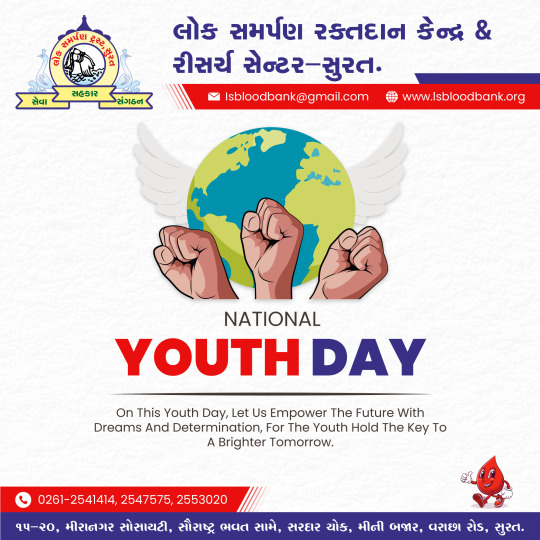
📢 National Youth Day!
➡️ On this youth day, Let us empower the future with dreams and determination, for the youth hold the key to a brighter tomorrow.
☎️ 0261-2541414 /2547575 /2553020
📧 [email protected]
🌐 https://www.lsbloodbank.org/
📍 15-20, Mira Nagar Society, opp. Saurashtra Patel Bhavan, sardar chok, Mini Bazar, varachha road, Surat.
0 notes